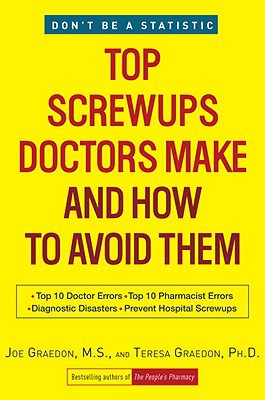

| TOP SCREWUPS DOCTORS MAKE AND HOW TO AVOID THEM Joe Graedon Teresa Graedon New York: Crown Archetype, August 2011 |
Rating: 5.0 High |
|||
| ISBN-13: 978-0-307-46092-1 | ||||
| ISBN-10: 0-307-46092-6 | 314pp. | HC | $26.00 | |
Just as the housewives of Love Canal in upstate New York reacted to Hooker Chemical Company's negligence by organizing reforms, so the Graedons — instead of filing a lawsuit when staff at Duke Hospital screwed up several times and caused the premature death of Joe Graedon's aged mother — decided to start a campaign aimed at preventing such mistakes from happening again.
Duke Hospital is clearly one of the country's finest medical institutions. Nevertheless, lethal errors have been made [there]. Since my mother's death, a young Mexican American woman, Jessica Santillian, received a mismatched heart during a transplant operation at Duke and died. A baby was accidentally burned in the neonatal intensive care unit. Thousands of surgical patients were exposed to used elevator [hydraulic] fluid during surgery because the fluid was mistakenly put in old detergent containers. The instruments were then washed with this hydraulic fluid instead of detergent. Those are just the Duke cases that have received media attention. |
It's easy and gratifying, but pointless, to say these mistakes are inexcusable. (OK, putting used hydraulic fluid in detergent bottles and then LEAVING IT THERE TO BE FOUND is inexcusable.) But medical mistakes are going to happen. One way to minimize them is to educate patients about well-known hazards like drug interactions. That is what the Gradeons have been doing since 1976. They have written 18 books, and they host a weekly radio show on PBS. These shows are available as podcasts through their Web site.
Here's an example, taken from this book but in my own words, of the ten most common shortcomings doctors display. The book expands on all of these and tells how to deal with them.
In short, this book is useful to read for patients entering the "prime treatment years," or those with relatives at that stage of life. But it is a list of problems that most who deal with the medical system as customers probably know already, at least in part. And there are useful appendices, such as the list of "Top Ten List of Potentially Problematic Pills," which is really a list of ten classes of medicine that can cause problems. Like Narcotic analgesics (hydrocodone with acetaminophen) or Quinolone-type antibiotics (ciprofloxacin). Cipro can poison the central nervous system or cause tendon problems, especially in people over 60. Or the common mistakes related to common diseases like benign prostatic hyperplasia. (This section discusses several drugs, including tamsulosin. It also mentions herbal products like saw palmetto or Pygeum africanum, but cautions that these are unregulated and advises consulting independent evaluations like those found at Consumer Lab, which has provided independent reviews of health and nutrition products since 1999.
Top Screwups is well researched and has a good index. I give it top marks and consider it worth reading. However, I don't consider it a keeper; for specific information I would recommend the use of on-line resources, including the Graedons' own Web site The People's Pharmacy.

 To contact Chris Winter, send email to this address.
To contact Chris Winter, send email to this address.